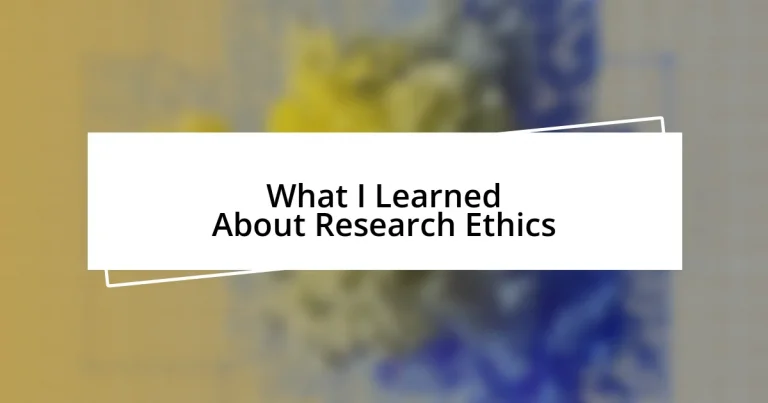Key takeaways:
- Research ethics hinge on principles such as respect for participants, integrity, and justice, emphasizing the responsibility researchers have towards those they study.
- Adherence to ethical guidelines safeguards participant rights, enhances research credibility, and promotes accountability within the research community.
- Informed consent is critical; researchers must ensure participants fully understand the implications of their involvement, particularly in vulnerable populations.
- Teaching ethics in research is essential for cultivating a mindset of integrity, encouraging open dialogue, and fostering a collective responsibility among researchers.
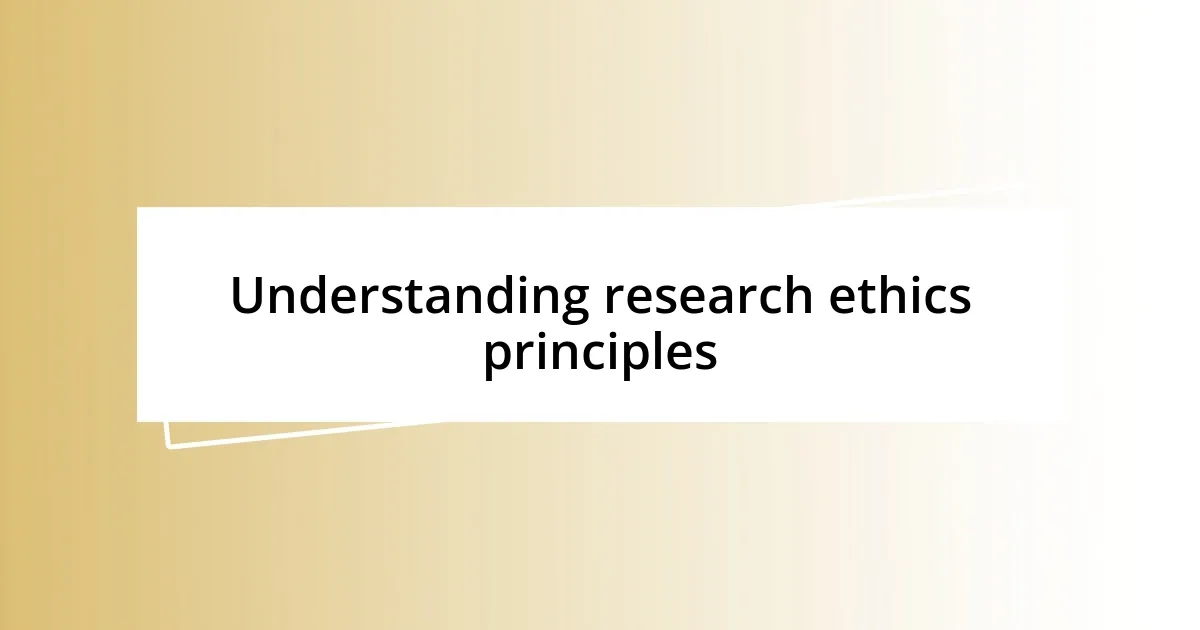
Understanding research ethics principles
Research ethics principles are essentially the backbone of responsible research practice. I remember my first experience in a lab, feeling the excitement of discovery, but also a looming sense of responsibility. It struck me then: every finding has ethical implications, especially when real lives are involved. How do we ensure the integrity of our work while prioritizing the well-being of participants?
At the core of these principles are respect, integrity, and justice. Respect for persons means acknowledging the autonomy of research participants, which can be challenging, especially in vulnerable populations. I once saw the delicate balance of this principle during a study involving children; the process required extra care to ensure their voices were heard, something that truly resonated with me. It made me realize—have we, as researchers, considered how our actions affect those we study?
Additionally, integrity emphasizes honesty and transparency in research. I learned this firsthand when I encountered conflicting data in one of my projects. The urge to ignore the inconsistency was strong, but I recognized that resolving it with transparency could ultimately strengthen the research. It’s a vital reminder for all of us: Who benefits from the truth, and are we willing to embrace it, no matter how uncomfortable? This commitment to ethical standards isn’t merely academic; it’s a moral compass guiding me through the complexities of research.
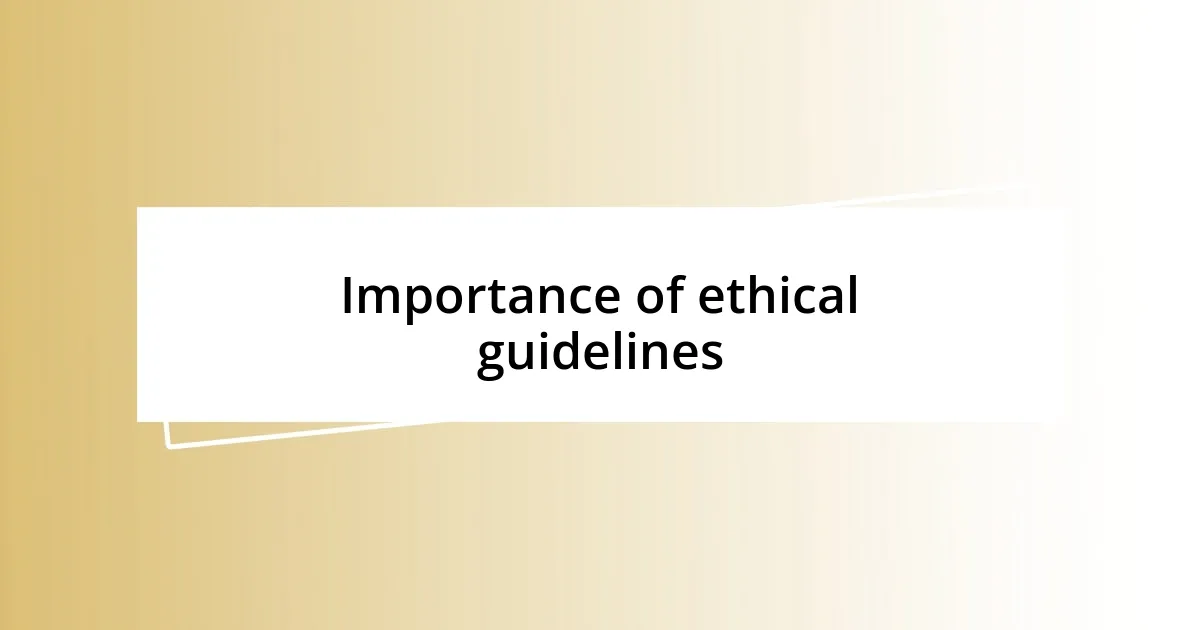
Importance of ethical guidelines
Ethical guidelines are crucial in research because they protect the dignity and rights of participants. I recall a project where we had to navigate the sensitive topic of mental health. The ethical considerations forced our team to pause and reflect on how our questions could impact participants emotionally. These guidelines served not just as rules, but as a reminder to treat every individual with the care and respect they deserve. It’s a powerful realization that research is not just about data; it deeply involves human experiences.
Moreover, adhering to ethical guidelines enhances the credibility of research findings. A memorable instance was during peer review, where reviewers scrutinized our ethical protocols. Sharing our commitment to transparency strengthened our case. I had always felt that ethical integrity builds trust—not just between researchers and participants, but also within the wider community. Trust translates into openness during research discussions, fostering collaboration and the sharing of ideas.
Finally, ethical guidelines promote accountability, ensuring that researchers are held responsible for their actions. There was a time when a colleague struggled with manipulating data to fit a desired outcome. In our conversations, it became clear how easy it is to slip into that mindset, especially under pressure. By embracing strict ethical standards, I learned we not only protect ourselves but also uphold the integrity of the entire research field. This commitment resonates with me; it symbolizes a pledge to honesty in an often competitive environment.
| Importance of Ethical Guidelines | Effects on Research |
|---|---|
| Guides respectful treatment of participants | Promotes trust and cooperation |
| Enhances credibility of findings | Facilitates valuable feedback |
| Encourages accountability in research | Maintains the integrity of the research field |
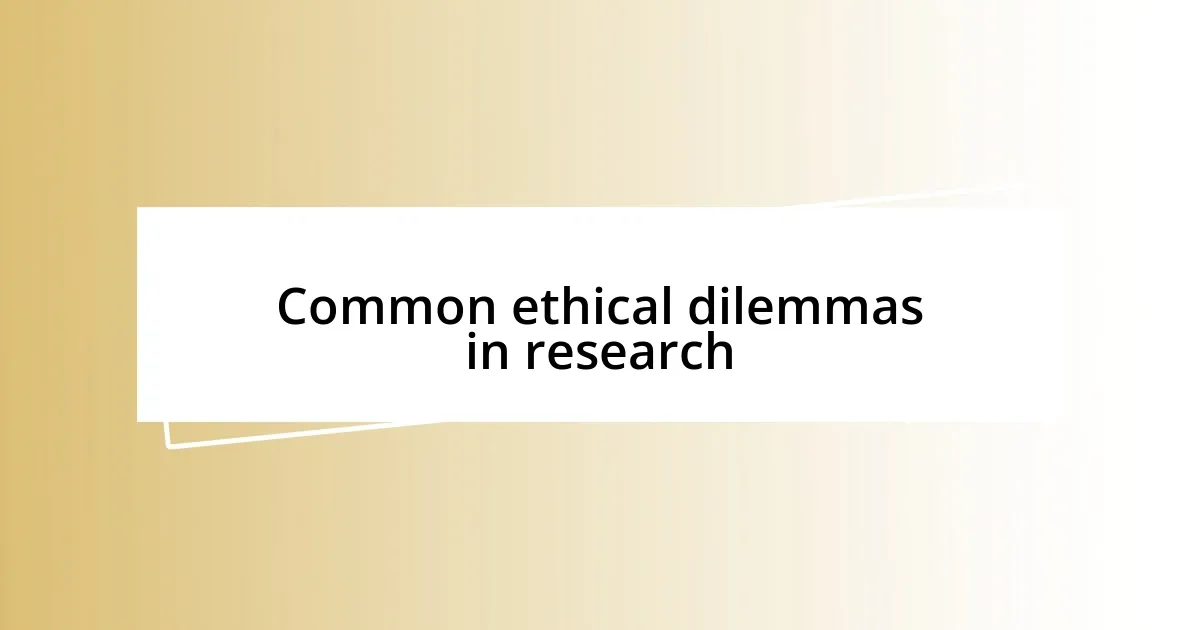
Common ethical dilemmas in research
One of the most pressing ethical dilemmas I’ve encountered in research involves informed consent. The challenge often lies in ensuring participants completely understand what they are agreeing to. I once worked on a project related to clinical trials where the medical jargon was overwhelming; I felt the weight of responsibility to translate complex information into comprehensible language. It’s an ongoing reminder that true consent isn’t just a signature—it’s a genuine understanding of the process and potential risks.
Ethical dilemmas in research can manifest in various ways, including:
- Conflict of Interest: When a researcher’s personal or financial interests might compromise the integrity of the study.
- Coercion: Situations where participants feel pressured to join, compromising their autonomy.
- Data Privacy: The challenge of safeguarding personal information while still gathering relevant data.
- Exploitation: Concerns about vulnerable populations being used for research without fair compensation or consideration.
Navigating these complexities can be daunting, yet they are crucial for maintaining the integrity of our work. I remember a time when our team faced intense scrutiny because we had to balance rigorous research with ethical responsibilities. It taught me that addressing these dilemmas requires not only adherence to ethical standards but also a personal commitment to uphold the dignity of every individual we engage with. This blending of heart and practice is what makes ethical research truly meaningful to me.
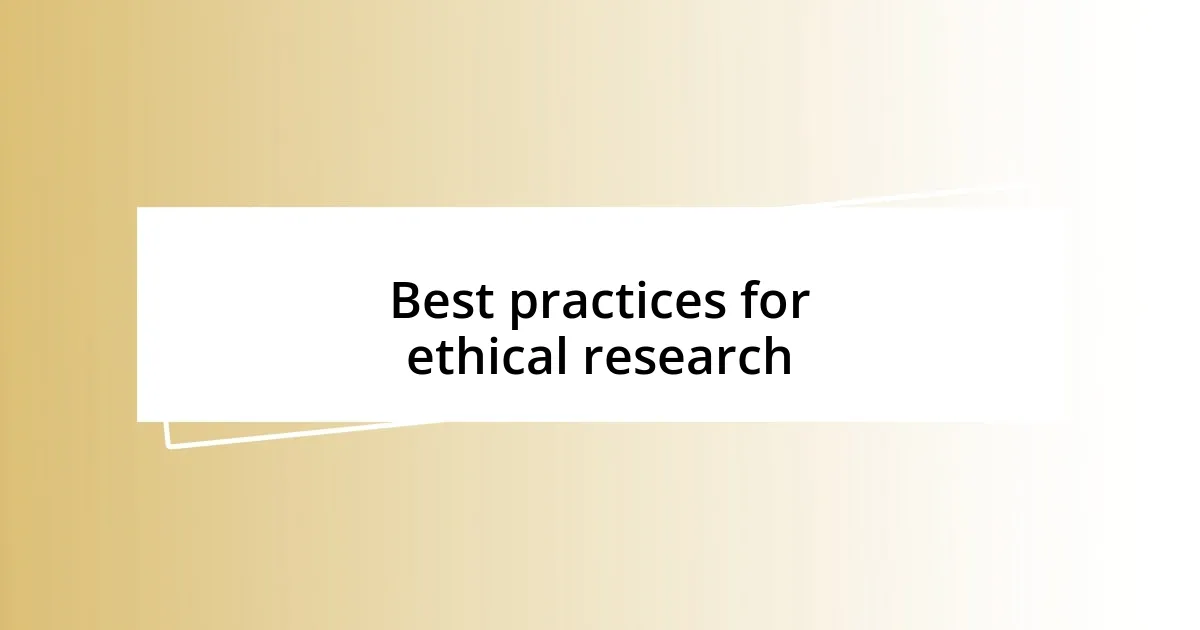
Best practices for ethical research
Best practices for ethical research revolve around prioritizing the welfare of participants throughout the research process. In my experience, creating a thorough informed consent process is essential. I remember a project where I spent hours developing easy-to-understand consent forms, as I knew participants had to be fully on board and aware of what they were signing up for. This attention to clarity not only fosters trust but also empowers individuals by ensuring they understand their role.
Another vital practice involves maintaining transparency with your research methods and findings. I’ve found that when I openly share both the successes and the challenges faced during a project, it encourages dialogue with peers and improves the overall quality of the work. It’s like inviting colleagues into the journey rather than just presenting them with the destination. Doesn’t this openness create a more collaborative atmosphere in the research community?
Lastly, continuously revisiting and reflecting on ethical standards is crucial. I often set aside time to evaluate how my projects align with these principles. There was a moment when I realized that in pursuing groundbreaking discoveries, I had unintentionally overlooked certain ethical considerations. Taking a step back helped me realign my focus. How often do we self-check our adherence to these important guidelines? This practice keeps us accountable and emphasizes that ethical research is an evolving process, ultimately enriching the integrity and impact of our work.
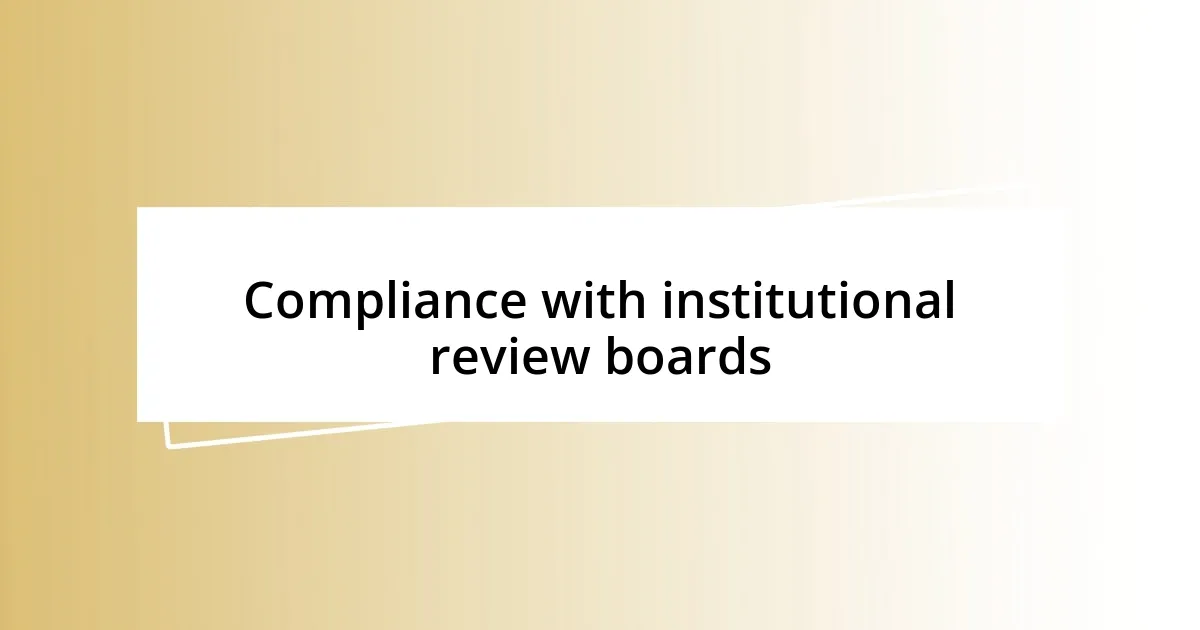
Compliance with institutional review boards
Navigating compliance with Institutional Review Boards (IRBs) has been one of the most eye-opening experiences in my research career. I vividly remember preparing my first application; the sheer amount of detail required initially felt overwhelming. However, I soon realized that each section of the application is crucial. They exist to protect participants and ensure that we maintain ethical standards. I’ve learned that thorough preparation not only smooths the approval process but also deepens my understanding of ethical practices.
Each interaction with an IRB is like a mini-seminar on ethics. When I presented a new study proposal recently, I felt a mix of anxiety and excitement about how the board would receive my plans. To my surprise, their questions went beyond the surface, delving into the ethical implications of my methodology. This experience reinforced for me the importance of anticipating feedback and embracing the scrutiny of an IRB. After all, isn’t it reassuring to know that there’s a dedicated body ensuring that our research is responsible and respectful?
What strikes me most is how compliance with IRBs fosters a culture of accountability. I often reflect on the discussions I’ve had with board members regarding participant welfare. These conversations made me feel like we’re all on the same team, striving for ethical excellence. Have you ever felt that sense of collaboration in a seemingly bureaucratic process? I certainly have, and it has encouraged me to think more critically about the ethical dimensions of my work. Ultimately, complying with IRBs isn’t just a checkbox—it’s a commitment to ethical integrity that enriches our research endeavors.
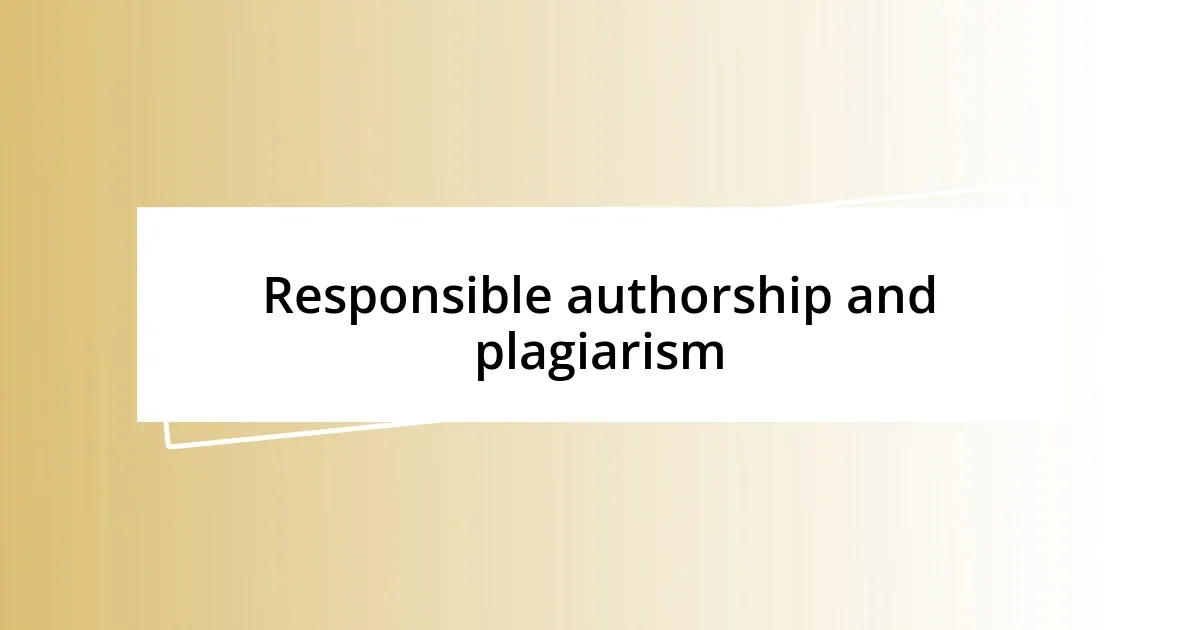
Responsible authorship and plagiarism
Responsible authorship goes beyond simply listing names on a paper; it’s about acknowledging contributions accurately. I recall a situation where a colleague’s work became a significant foundation for my own research. As I wrote the manuscript, I felt compelled to recognize their input sincerely. It reinforced my belief that credit isn’t just a formality; it’s a vital part of fostering a respectful scholarly community. Have you ever had someone else’s efforts shape your work? It made me reflect deeply on how crucial it is to be transparent about authorship.
Plagiarism, in its many forms, is a betrayal of trust within academia. I learned this the hard way when I accidentally paraphrased a passage too closely without proper citation. The sense of dread I felt when it was pointed out to me was a wake-up call. I realized how easily it can happen, even unintentionally, but this experience only fueled my commitment to careful scholarship. How many times do we rely on memory rather than double-check sources? It’s an important reminder to always uphold academic integrity.
Maintaining responsible authorship requires continuous vigilance. I often set reminders to evaluate my citations and references, ensuring that no source goes unacknowledged. There was a time I decided to organize a workshop for my lab on citation practices, and the following conversations sparked a new level of awareness among my peers. Isn’t it fulfilling when knowledge becomes a shared resource? Cultivating an environment where we all understand and prioritize these ethical aspects truly enhances the integrity of our research.
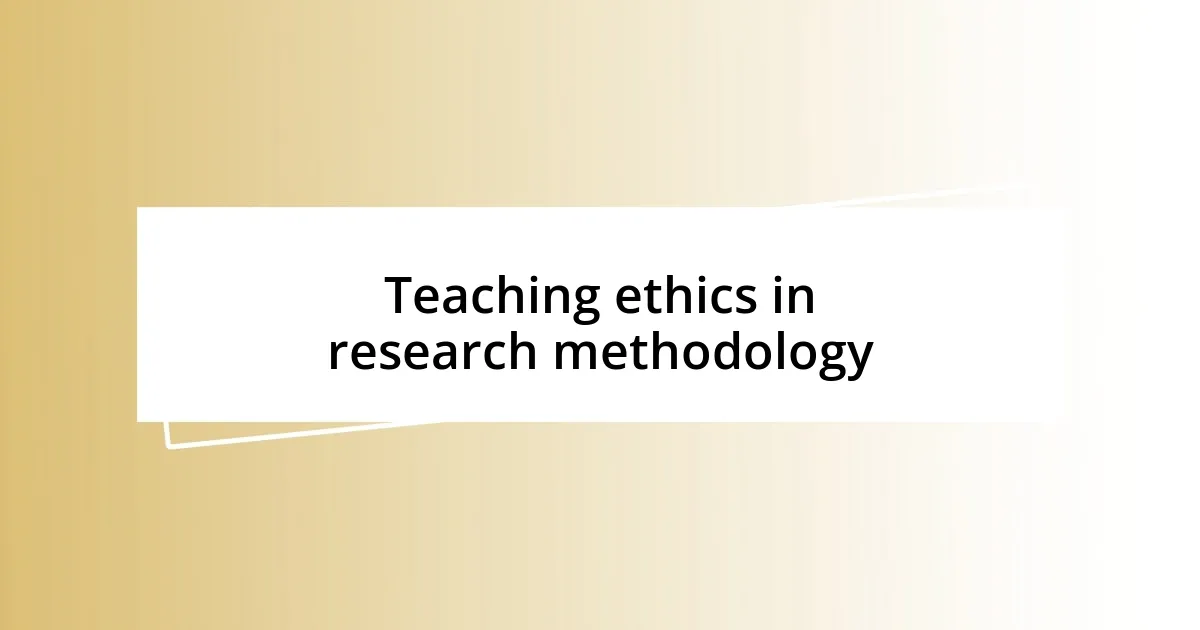
Teaching ethics in research methodology
Teaching ethics in research methodology is a vital component that shapes how we approach our work. I remember my first ethics workshop; it was a small group, but the conversations were intense and enlightening. We dove deep into case studies, discussing real dilemmas that researchers face. This kind of interactive learning ignited my passion for ethical research practices. Have you ever felt that spark when diving into a meaningful discussion? It makes all the difference.
Through these workshops, I learned that teaching ethics isn’t just about rules—it’s about instilling a mindset. I once served as a mentor for new graduate students, and I emphasized the importance of questioning methodologies and their implications. One student boldly challenged us during a discussion on informed consent, asking if participants can truly give consent when they may not understand complex terminology. His inquiry opened my eyes to the fundamental necessity of clear communication in research. How often do we overlook the clarity in our work, assuming our audience understands? This realization has reshaped how I convey ethical considerations in my research design.
Moreover, integrating ethical discussions into research methodology encourages ongoing dialogue among peers. I vividly recall a lively debate in our research group about the ethical limits of data collection. It wasn’t just about adhering to guidelines; we all brought our perspectives and experiences to the table. This collaboration made me feel connected and reminded me that ethical research is a collective responsibility. Isn’t it enriching to learn from each other and build a community rooted in ethical standards? That shared commitment transforms our approaches and fosters an environment of trust and integrity in our research endeavors.












